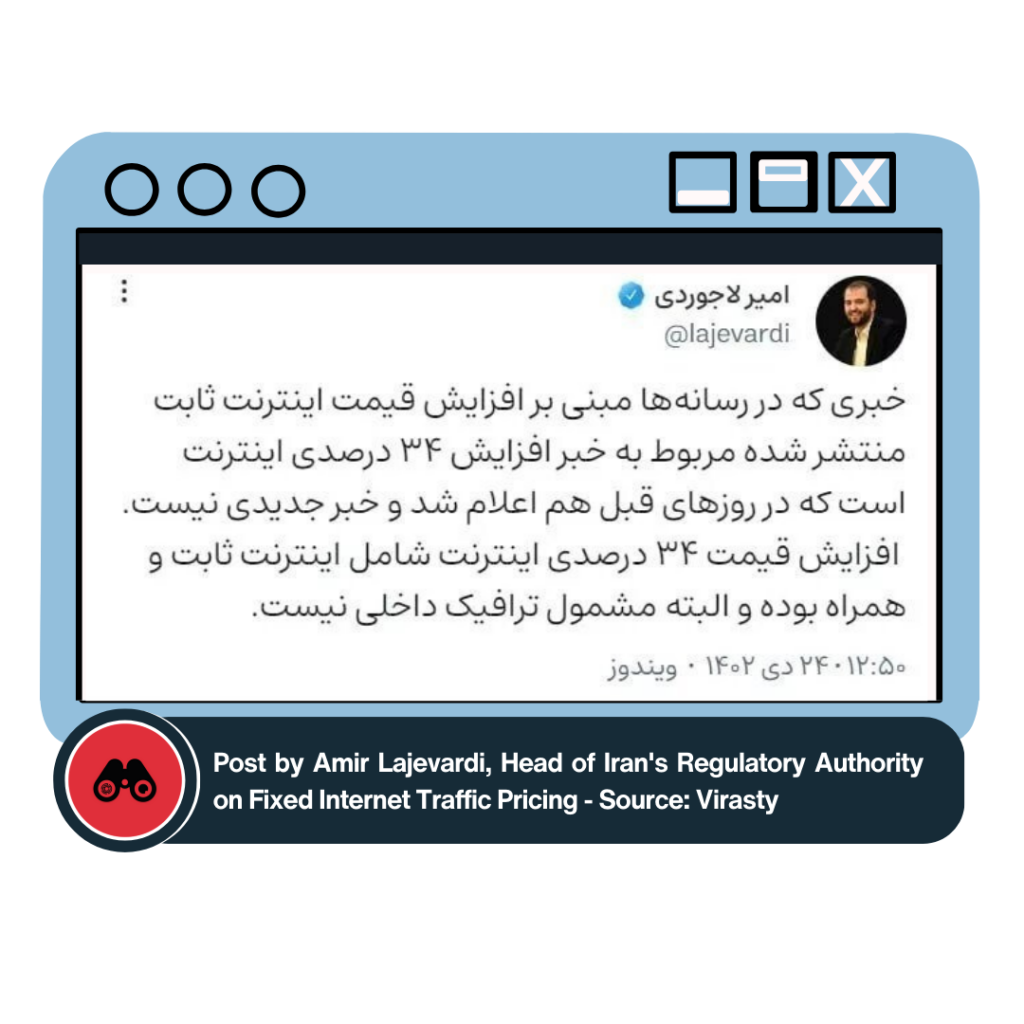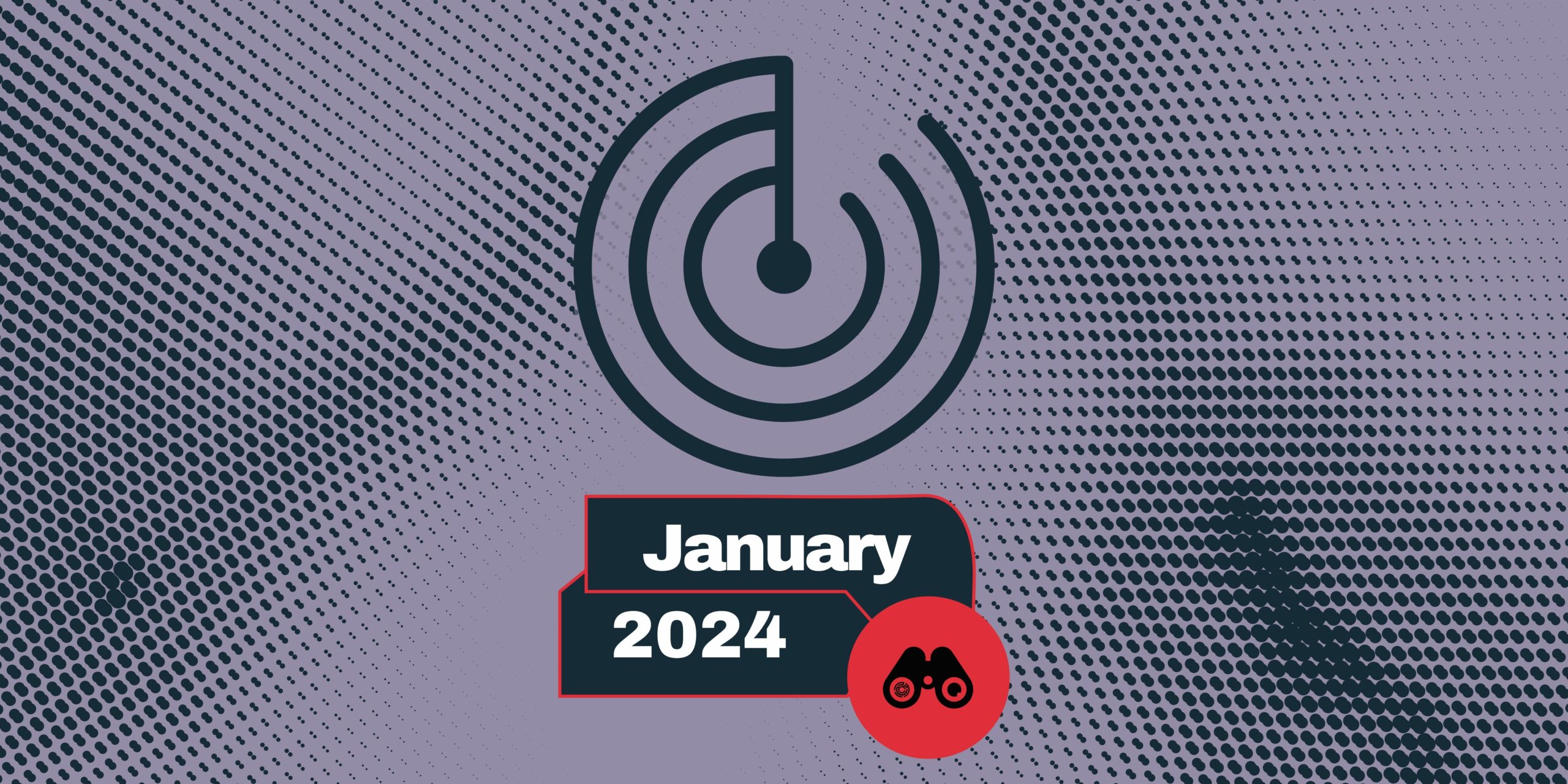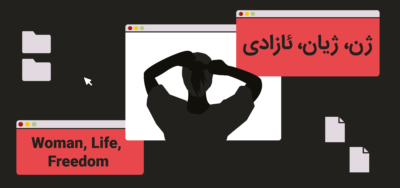On January 14, 2023, regulators issued a decree that authorized operators to raise fixed internet prices by 7 to 34 percent.
This was preceded earlier in the month by a price hike in mobile internet packages, which also removed long-term, cost-effective volume packages. The price increase only applied to international traffic for both fixed and mobile internet, while domestic traffic within the national information network stayed the same.
This economic strategy ultimately compels the user to rely on the national information network.
The price of internet has now been increased for the second time under President Raisi’s government.
The first increase occurred in April 2021, when the government claimed it needed to improve the service quality, and the cost of fixed internet supported by the government increased by up to one hundred percent.
In addition to this official notice, fixed internet operators removed cheaper long-term packages and speeds under 2 Mbps in August 2022, pushing users towards more expensive packages.
Against this backdrop, the Ministry of Communications is implementing strategies to push users to use domestic networks, such as lowering the bandwidth for international versus domestic traffic, causing intentional disruptions on foreign sites, and making black and gray lists to separate sites based on their location inside or outside Iran. The Tehran E-commerce Association reported these in July 2023 and January 2024.
National Cyber Space Center Directive for Data Protection Released
The National Cyber Space Center’s guideline for data protection was published on January 21, 2023. The full title of this four-article directive is “Executive Guideline for Enhancing the Protection of User Privacy and the Collection, Processing, and Storage of User Information in Cyberspace Systems and Platforms,” which mandates executive devices to specify within two months what data they have collected from users and for what purpose. Data identifying the user must also be encrypted. Non-compliance with these provisions will have criminal and legal liabilities for virtual service providers.
Content Regulation for Criminal Content Approved
On January 9, 2023, Peyvast reported that the National Cyber Space Center has approved a document regulating relations in the field of criminal content in cyberspace, aiming to clarify the regulatory relationship with platforms. The text of this document has not been publicly released at the time of writing this report.
Draft Amendment to the Computer Crimes Law Presented to the Chief Justice
On January 16, 2023, Peyvast reported that the draft amendment to the Computer Crimes Law, which includes discussions on data protection, critical and sensitive systems, and related penalties, has been presented to the Chief Justice.
New Branch in the Supreme Court; For Cybercrime Cases
On January 24, 2023, Zoomit reported that a special branch for cybercrime is to be established in the Supreme Court to address cybercrimes and threats.
Data Protection Bill to be Presented to Parliament by the End of the Year
Isa Zarepour, the Minister of Communications, stated on January 3, 2023 that the bill for the protection and safeguarding of personal data, after undergoing revisions and reviews, will be presented to the Parliament by the end of the year.
The first draft version was an attempt to create a legal framework for the protection of personal data in 2018 during former Communications Minister Azeri Jahromi’s term, but it was presented to the Parliament. Another draft was submitted by representatives in 2020 but remained unaddressed with the onset of President Raisi’s government. The bill currently being prepared under President Raisi’s government is the third attempt at creating a law to protect personal data and has not yet been finalized.
Payam Airport Customs to Begin Operations by the End of the Solar Year
Akbar Ghanbarpour, CEO of Payam Airport, told ISNA on January 14, 2023 that the specialized IT customs – aimed at implementing registration and monitoring of imported hardware – will start operations at Payam Airport, affiliated with the Ministry of Communications, by the end of the solar year. Registering hardware allows the government to track hardware, control imports, and enforce the installation of native operating systems, violating citizens’ privacy and taking away their right to choose their preferred products.
Bill for Enhancing Women’s Security Approved
Digikala reported that the emergency bill for enhancing women’s security, officially titled “The Plan for Protection, Dignity, and Security of Women Against Violence,” was approved on January 1, 2023. In it, sending obscene and pornographic images to women is criminalized, with specified penalties.
In Article 30 of this bill, it states: “Anyone who, without consent and contrary to the wishes of a woman, sends via computer systems, telecommunications, or any other means, a message, image, or symbol that is obscene or vulgar and generally causes mental distress to conventional individuals, will be fined at the sixth degree if the content is obscene, and at the seventh degree if it is vulgar.”
Content Producers to Share Revenue from Traffic Sales
Karang Website reported on January 24, 2023 that the Supreme Council of Cyberspace has approved the “Policy Document and Tariff Requirements for Network Traffic and Content Revenue Sharing,” allowing content producers on platforms, social networks, and social media to share in the revenue from traffic sales.
This revenue sharing applies to users who produce content on the national information network and does not include content produced on social networks like Instagram; a step towards drawing users to domestic platforms with economic levers.
Implementing such a process limits users’ choices and forces them to use domestic platforms.
The full text of this document has not been published at the time of writing this report.
Directive for Organizing Communication Identifiers Issued
ISNA reported on February 8, 2023 that the Supreme Council of Cyberspace has issued a directive for organizing the assignment of communication identifiers.
This directive, issued by the High Commission for the Regulation of Cyberspace in line with implementing the system of authentic identity in cyberspace, prohibits the assignment of communication identifiers without identity verification and applies to communication platforms and businesses as well.
In other words, the use of domestic platforms is not permitted without identity verification; a matter that conflicts with remaining anonymous on the network or anonymity as one of the necessary foundations for realizing the right to freedom of expression, free access to information, and privacy protection. Implementing such a process brings the Iranian government one step closer to identifying and monitoring users.
Parliament: Ministry of Roads and Municipalities to Quickly Issue Fiber Optic Installation Permits
Farsnews reported that the Islamic Consultative Assembly representatives, during the public session on January 28, 2023, as part of the review of the 2024 budget integration report, obligated the municipalities of the entire country and the Ministry of Roads to deliver permits for excavation and installation of fiber optic equipment to the operators providing this infrastructure within 15 days.







